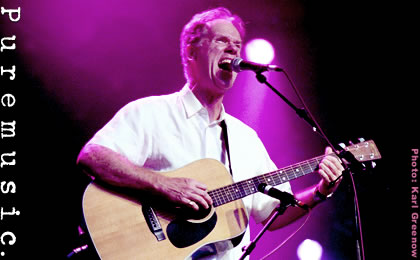
A Conversation with Loudon Wainwright (continued)
LW: No, the funny thing--and it's funny that I should use that word, that expression, "the funny thing"--he's very, very funny. I mean, again, he has a bit of a reputation for being--although certainly he has great funny witty songs, but--the expression that they use in England sometimes, doomy, he has a doomy quality.
PM: A doomy quality. [laughs]
LW: But he's the lightest, happy-go-luckiest guy--but not smiley faced, he's got a real edge to him. But he's very funny. He does wonderful impressions, and can do entire Monty Python bits--
PM: Oh, really?
LW: --word perfect, and--
PM: Oh, he does voices and all--
LW: Everything. Has a wonderful arcane knowledge on subjects like cricket and hang gliding. I mean, he's an expert on many things. He's a real all-around guy.
PM: Does he hang-glide himself, do we know?
LW: I don't know. I made up that thing about hang-gliding.
PM: Oh, yeah. I never have known a stringmeister who seriously hang-glided. [Actually, I remembered later that Banana of The Youngbloods, a fantastic stringmeister, was an expert hang glider and had a school on the West Coast for awhile...]
LW: He plays tennis, and I beat him at tennis.
PM: [laughs] So I read!
LW: Right. I'm always happy to mention that.
PM: Are you guys good?
LW: No, we both suck.
PM: You're hacks.
LW: Right, totally. But that's the great thing about tennis. You can be terrible at it and still somehow imagine that you're wonderful.
PM: Yeah, because as long as you're putting wood to the ball, it's just like you're really doing something good.
LW: Yeah. Usually it is wood to the ball.
PM: [laughs]
LW: Rarely is it nylon.
PM: Let's see. So we should say something, please, about V.D., himself.
LW: Oh, the legend. Well, Van Dyke, I first met--actually it was Rufus related. A friend of mine--actually it was David Mansfield's wife, Maggie Greenwald, who's a film director--she said when she heard this voice and piano tape of my son Rufus, some of his earliest material, she said, "You know who needs to hear this? Van Dyke Parks." So I was out in L.A.-- this was years ago--and I had this cassette in my coat pocket. And I went to a Bug Music party in L.A.
PM: Are you a Bug guy?
LW: They do some of my collecting for me, yeah. But anyway, all of a sudden Van Dyke walked past. And I said, "Van Dyke"--we had met once before at a guitar store or something--and I said, "Listen, I know this happens all the time, but listen to this," and I gave it to him. And he was knocked out. And then he called Lenny Waronker over at Dreamworks.
PM: Wow.
LW: So if it weren't for me, that punk wouldn't have a deal.
PM: [laughs] He'd be walking the streets.
LW: In so many ways, if it weren't for me. And Van Dyke, of course, did the string arrangements on that very great record.
PM: Right.
LW: So he and I go back a while. We just did some shows in Germany together, actually.
PM: Oh, yeah, yeah. I forgot to put that in my questions. Thank you. With Frisell and Leisz, right? [Bill Frisell mentioned this gig in our recent interview with him.]
LW: Yeah. With Bill Frisell and Greg Leisz, and Kenny Wolleson playing drums, and Tony Sherr, an incredible bass player. And Van Dyke got in touch with these people in Utrecht, Holland, the Mondrian String Quartet.
PM: Oh, my.
LW: It was amazing. We had a great time.
PM: So that was in the Ruhr, right?
LW: In the Ruhr Valley, yeah. We stayed in Essen, but the actual show was in Duisberg.
PM: Essen, that means food, right?
LW: Yeah, and it means eat. And we did, indeed. We had a good time there. That was just a couple weeks ago.
PM: We interviewed Bill not long ago. And I'm a huge fan of his playing. And he had to be a totally different kind of guitar player to work with. And I guess he was the bandleader, right--
LW: Yeah.
PM:
Can you say any more about the actual music-ness of that experience with
him? What were the actual shows like?
continue
print (pdf) listen to clips archives puremusic home